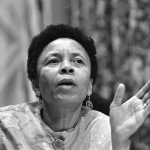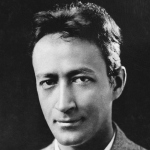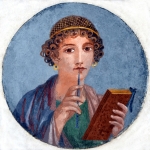1963
What shall I tell my children who are black
Of what it means to be a captive in this dark skin
What shall I tell my dear one, fruit of my womb,
Of how beautiful they are when everywhere they turn
They are faced with abhorrence of everything that is black.
Villains are black with black hearts.
A black cow gives no milk. A black hen lays no eggs.
Bad news comes bordered in black, black is evil
And evil is black and devils' food is black…
What shall I tell my dear ones raised in a white world
A place where white has been made to represent
All that is good and pure and fine and decent.
Where clouds are white, and dolls, and heaven
Surely is a white, white place with angels
Robed in white, and cotton candy and ice cream
and milk and ruffled Sunday dresses
And dream houses and long sleek cadillacs
And angel's food is white…all, all…white.
What can I say therefore, when my child
Comes home in tears because a playmate
Has called him black, big lipped, flatnosed
and nappy headed? What will he think
When I dry his tears and whisper, "Yes, that's true.
But no less beautiful and dear."
How shall I lift up his head, get him to square
His shoulders, look his adversaries in the eye,
Confident of the knowledge of his worth,
Serene under his sable skin and proud of his own beauty?
What can I do to give him strength
That he may come through life's adversities
As a whole human being unwarped and human in a world
Of biased laws and inhuman practices, that he might
Survive. And survive he must! For who knows?
Perhaps this black child here bears the genius
To discover the cure for…Cancer
Or to chart the course for exploration of the universe.
So, he must survive for the good of all humanity.
He must and will survive.
I have drunk deeply of late from the foundation
Of my black culture, sat at the knee and learned
The truth, so often obscured and omitted.
And I find I have much to say to my black children.
I will lift up their heads in proud blackness
With the story of their fathers and their fathers
Fathers. And I shall take them into a way back time
of Kings and Queens who ruled the Nile,
And measured the stars and discovered the
Laws of mathematics. Upon whose backs have been built
The wealth of continents. I will tell him
This and more. And his heritage shall be his weapon
And his armor; will make him strong enough to win
Any battle he may face. And since this story is
Often obscured, I must sacrifice to find it
For my children, even as I sacrificed to feed,
Clothe and shelter them. So this I will do for them
If I love them. None will do it for me.
I must find the truth of heritage for myself
And pass it on to them. In years to come I believe
Because I have armed them with the truth, my children
And my children's children will venerate me.
For it is the truth that will make us free!



















Comment form: